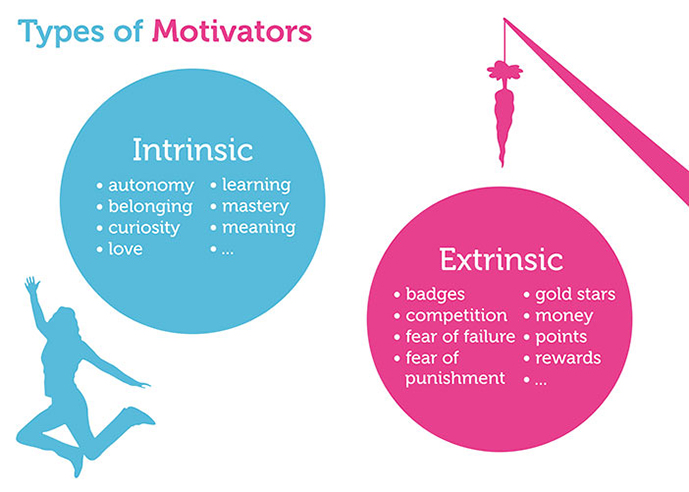Individuals work toward and commit themselves to a certain goal to attain achievements. The incentives behind those motivations can differ. Behaviors driven by external rewards, such as money, fame, praise are designated as extrinsic motivation, whereas intrinsic motivation refers to behavior to fulfill an individual’s personal satisfaction (e.g. enjoyment, acquisition of further knowledge, curiosity/interest). Both extrinsic and intrinsic motivation play a substantial role in the daily lives of many.

More specifically , extrinsic behavior emerges due to focus on externally-provided rewards, while intrinsic motivation occurs from the desire to gain an internally-produced reward. Reading this article because of an interest in types of behavior and motivation is an example of intrinsic motivation. Most of the time, intrinsic motivation, such as increasing knowledge, doesn’t have external rewards, this does not stop individuals from behaving based on intrinsic motivation. People will continue to carry out actions even though the results will not be as rewarding compared to behaviors from extrinsic motivation. Even writing this article is an example of intrinsic behavior—the desire to share information with others.
Due to the ongoing COVID-19 pandemic, I have been staying at the home of a family friend, the Bachtells’ since March. During the months I have stayed with Mr. and Mrs. Bachtell, I saw firsthand many instances of behaviors that arose from extrinsic or intrinsic motivation, as in my friend’s brother mowing the lawn for some pocket money, or Mrs. Bachtell, who is a history teacher, taking the time to read my long, 10-page history paper.

The following is paraphrased from a short interview of Mr. Bachtell, a self-professed comic book enthusiast.
Q. What are some of your biggest experiences off either intrinsic or extrinsic motivation?
“I love comic books and organizing my comics. I started collecting comics when I was five years old, and even today I buy five or six comic books a week. When I am finished reading them, I organize them in my larger collection alphabetically. Overall, I have 7600 comic books, with a database of comic books on my computer. To me, comics would be an intrinsic motivation, as reading, collecting, and organizing them alphabetically brings me satisfaction and joy. I also get to see my older comics and find joy when organizing new comic books.”

The following is from the interview with Mrs. Kristin Bachtell, a high school teacher:
Q. Why do you think intrinsic and extrinsic motivation exist?
“Intrinsic and extrinsic motivation is one theory developed by psychologists to explain why we do the things we do. In this theory when we do something because of our enjoyment of the activity, it is considered intrinsic motivation. When we do an action for an outside reward it is considered extrinsic motivation. In a school setting, grades, achievement awards, and punishments for poor performance are all considered extrinsic motivation for a student. The love of a subject, joy in reading or interest in pursuing a line of questioning are all considered intrinsic motivation. There are many studies that focus on the role these two forces work in an educational environment and how they impact creativity, cognition, and growth. In economics a central idea is that individuals respond to incentives, which is another way of looking at extrinsic motivation. But from a psychological point of view, rewards and punishments are seen more negatively because they can undermine intrinsic motivation, which leads to less individual growth over the long term.”
Q. If relevant, are there any intrinsic or extrinsic experiences in your current daily routine?
“In my own life, I’ve always had an interest in textiles and dressmaking. I’ve been at home because of COVID-19, and this has given me the time to learn to knit. Today, I drafted my first sewing pattern and mock up of a cloak I am planning on sewing. These activities only happen because of my interest and personal enjoyment in these areas. An example of extrinsic motivation is the fact that I make sure my car is inspected on time and receives the proper sticker so that I am not pulled over by a police officer and given a citation/ticket! I have no intrinsic motivation to get my car inspected by the state of West Virginia. But I know if I don’t there will be consequences I don’t like. So, I do it.”
Q. What could possibly be some positive or negative effects behavior incentivized from intrinsic or extrinsic motivation?
“It is generally understood that intrinsic motivation leads to students who are more engaged, more likely to retain information and are more creative problem solvers. However, by its very nature, intrinsic motivation is not something that a school or parent can require from a student, and there are many students who do not love school or all of their courses. This means that extrinsic motivation does play a role, if used judiciously, to help students set goals and meet them, even if they are not intrinsically motivated.”
Q. Which motivation do you prefer, and why?
“As a teacher, if I have a student that is intrinsically motivated it is wonderful because they are passionate and engaged about the subject. The energy in the classroom is more positive, the discussions are more in-depth and the knowledge gained is greater. In my own personal life, the things I have intrinsic motivation about are what I enjoy the most. However, that does not mean that I dislike extrinsic motivation. I also enjoy a well-ordered society in which people follow the laws put in place. Ideally, this occurs because individuals see the value and reason behind laws and are interested in the public good. But to give a very immediate answer, if the only reason why individuals in America will wear masks to combat COVID-19 is the fact that they cannot go into a store or the fact that they could receive a citation, then external motivations are also really valuable.”
Q. Any final thoughts or impressions on intrinsic or extrinsic motivation?
“In my opinion, as you get older you are most likely to be motivated intrinsically rather than extrinsically, but extrinsic motivation still plays a big role in my life. When I was young I was motivated to please my parents—getting good grades, or cleaning my room to make them happy. Ultimately, as an adult you have autonomy in your decisions: you can decide between what I want or what is better for you. Do I want to do this, do I need this, or do I enjoy this? You don't have as many authority figures trying to guide you in your decisions through external rewards. All in all, I think extrinsic motivation is not as effective and powerful as intrinsic motivation.”

Justin An
Freshman (Grade 9)
Mercersburg Academy

